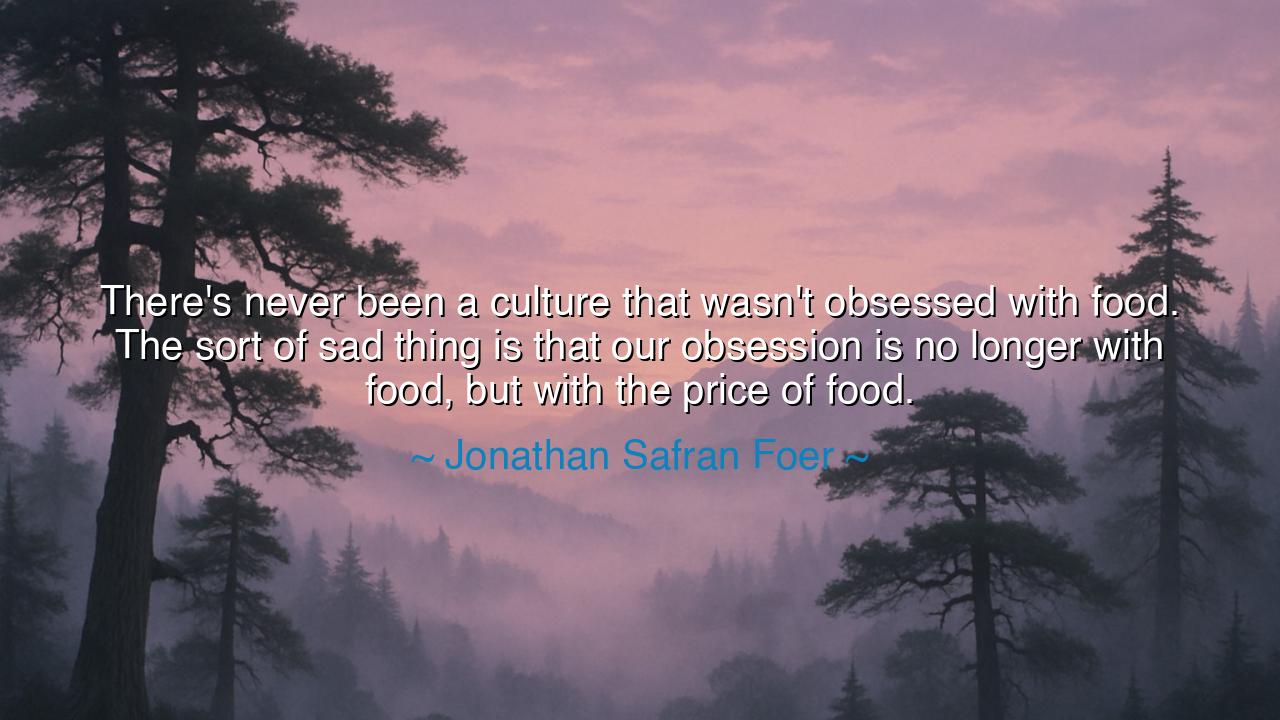
There's never been a culture that wasn't obsessed with food. The
There's never been a culture that wasn't obsessed with food. The sort of sad thing is that our obsession is no longer with food, but with the price of food.






Jonathan Safran Foer once wrote with quiet sorrow and great truth: “There’s never been a culture that wasn’t obsessed with food. The sort of sad thing is that our obsession is no longer with food, but with the price of food.” In this reflection, he mourns the fading reverence of humanity’s oldest relationship—the sacred bond between man and nourishment. Every civilization since the dawn of time has celebrated food, not merely as sustenance, but as ritual, as memory, as art. To eat was once to partake in creation itself. But in the modern age, Foer observes a terrible shift: our obsession, once spiritual, has become transactional. We no longer ask, “What does this food mean?” but rather, “How much does it cost?”
The ancients would have called such a change a sickness of the soul. In Greece, food was divine—Demeter was worshiped for grain, Dionysus for wine, and Hestia for the hearth. In China, the meal was an act of harmony; in India, an offering to the gods. Every culture saw in food the rhythm of life itself—seed, growth, harvest, death, renewal. But modern man, Foer laments, has severed that sacred thread. He eats in haste, buys in ignorance, and forgets that every loaf of bread is the result of sun and soil, sweat and sacrifice. What was once a ceremony of gratitude has become a calculation of cost.
The “sad thing” that Foer names is not merely about commerce—it is about consciousness. When we care only for the price of food, we no longer see the people who grow it, the animals that die for it, or the earth that gives it. Our fields are mechanized, our tables rushed, our senses dulled. The poet’s kitchen has become the accountant’s ledger. And what does this say about us? That in our pursuit of efficiency, we have forgotten reverence. We have gained abundance, but lost appreciation. We eat more, yet taste less; we have choice, yet know nothing of gratitude.
History reminds us that food has always mirrored the spirit of its age. In ancient Rome, as the empire grew decadent, banquets became displays of vanity rather than communion. Rare spices and exotic animals were paraded not for taste, but for status. So too today, we see echoes of Rome in our supermarkets and advertisements: cheap abundance for some, scarcity for others, and a disconnection that grows with every processed meal. Foer’s insight warns us that a culture that forgets the meaning of food forgets the meaning of life. For how we eat reflects how we live—hurried or mindful, selfish or shared.
Consider the humble farmer’s table of old, where family gathered not just to eat, but to commune. Bread was broken slowly, stories were told, and gratitude was offered to unseen hands. This was not nostalgia—it was wisdom. The food carried memory; the meal carried meaning. Today, many eat alone before screens, unaware that the act they perform is older than history itself. Foer calls us to remember that food is the language of care. When we eat thoughtlessly, we silence that language; when we eat mindfully, we restore it.
Yet his words are not despair but invitation. If we have fallen away from reverence, we can return. To eat with intention, to know where our food comes from, to honor the labor and life behind it—this is how we reclaim the sacredness we have lost. To obsess once more with food itself, rather than its cost, is to restore beauty to necessity. It is to see again that food is not a commodity, but a covenant between earth and humanity.
So let this be the lesson, O listeners of the future: eat as your ancestors did—not in haste, but in gratitude. Know the story of your meal. Cherish simplicity over abundance, and awareness over indulgence. For when you rediscover the holiness of food, you rediscover your connection to the world. And remember the truth hidden in Foer’s lament: a culture that counts the price of food but not its meaning is a culture that starves, even at a full table. But a people who eat with reverence will never hunger—for they feast not only with the mouth, but with the soul.






AAdministratorAdministrator
Welcome, honored guests. Please leave a comment, we will respond soon